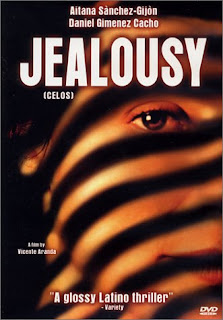One of the attributes of a true auteur is the ability to continually explore similar subject matter with each new film looking at it from a different angle and never having one film come across as a rehash of another. Vicente Aranda was one such auteur who fit that description. Although Aranda already had a number of favorite topics, most notably those of a sociopolitical nature, one of the most interesting things regarding Aranda’s career is his discovering of perhaps his favorite, and certainly most successful from a strictly economic standpoint, muse 27 years into his directorial career. Despite the sometimes dubious nature of Wikipedia, Aranda’s entry sums it up in a nutshell with “Love as uncontrollable passion, eroticism and cruelty are constant themes in his filmography. The frank examination of sexuality is one of the trademarks of his work, as seen in his most internationally successful film Amantes (1991).” Amantes was the start of a string of erotically charged psychodramas and thrillers which included the likes of Intruso (1993), The Turkish Passion (1994) and The Naked Eye (1998), all of which put under a microscope just how fragile humans truly are when it comes to sex, romantic relationships (specifically relationships that develop into love triangles) and especially jealously, the last of which gave Aranda’s 1999 film its name, yet another variation, and perhaps the most intense one yet, of Aranda’s favorite themes.
One month before his wedding, trucker Antonio discovers an old photograph of his fiancée Carmen with another mans arm wrapped around her shoulder which instantly triggers Antonio’s jealousy. When asked about the man in the photo, Carmen simply brushes it off, claiming he was an old friend and it was taken a long time ago. Antonio however isn’t satisfied and begins asking around, eventually discovering the name of the man, José. After the marriage, Carmen’s hopes of Antonio’s insistent pestering her about the photo are dashed when his obsession with José becomes not simply worse but all consuming. With Antonio’s envy at a fever pitch, Carmen is forced to admit the truth and confront a painful past she’d had hoped stayed buried with potentially fatal consequences.
In a way Jealousy (Celos) could be seen as the third film in a trilogy of sorts with Amantes and Intruso given that a third individual interrupts the (for all intensive purposes) happy lives of two, however the film plays out more like a spiritual sequel to The Turkish Passion, which dealt with female jealousy and the irrational behavior that can arise as a result. With Jealousy, Aranda reverses the sexes and the results are nothing short of mental. Like Aranda’s other films that follow a similar trajectory, Jealousy works on a variety of levels, be it a psychological drama or an erotic psych thriller. Out of all of Aranda’s similarly themed films, its Jealousy that takes the thriller route the most with the obvious reason being the increasingly irrational behavior of Antonio, but the film is far from one note in that regard with the film gradually turning into a mystery as the more Antonio asks around about José, the more questions arise about Carmen’s tainted past and the mystery of just who is José and what was the nature of he and Carmen’s relationship. Aranda slowly puts the pieces of Carmen’s past together and when more is revealed the film also becomes somewhat of a crime story, another element which places it alongside the likes of Amantes and The Turkish Passion. Aranda brilliantly brings everything to a boiling point leading up to an absolutely jaw-dropping, rain soaked finale that is almost Takashi Ishii-esque in its visceral, unexpected impact and visual design.
When Jealousy played the festival circuit some not very bright critics labeled the film misogynist with one particularly idiotic review from Time Out claiming the film portrayed women as “sex-obsessed primitivists”. Clearly whoever wrote that must have only been paying attention during the scenes where the two main women characters discuss sex as “primitive” is the last word that springs to mind when discussing the character of Carmen thanks to Aitana Sánchez-Gijón who gives an incredibly nuanced performance of a woman clearly eaten up with her own conflicted views of the combustible situation she suddenly finds herself in. As far as the cries of misogyny go, the last thing Aranda portrays the men in the film as is sympathetic, with Antonio’s behavior being downright psychotic and his fellow trucker friend Louis having jealousy issues of his own, stating at one point in the film how he’d like to lock Carmen’s friend Cinta away in a room so no other man would touch her. Aranda also wisely avoids any cliché “battle of the sexes” type of scenarios as well with Antonio clearly going far beyond the point of unreasonable and Carmen’s lack of honesty not helping matters. In Aranda’s view, nobody wins. Although it may have been hyper dramatized for the sake of film, the general idea that Aranda puts forth is far from unrealistic, ultimately making Jealousy one of his most frightening films.


No comments:
Post a Comment